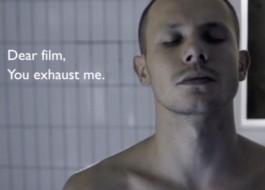
dear film, you exhaust me
19’37” | Audiovisual essay
Austria | 2018
watch here
This is an audiovisual presentation at the conference "Impacts of Gender, Eastern Europe in Comparative Perspectives, Literature, Art, Film, Language and Music" (University College London, 2018), which ultimately turned into an article "Idiosyncratic Ambiguities of Queer(able) Experience in Polish Film in the Early 2010s." The abstract:
The search for queer/queerable moments in the post-1989 Polish cinema is a frustrating feat. While increasingly featuring LGBTQ+ characters, especially in the current decade, Polish cinema films rarely break away from heteronormative and, less frequently, homonormative stereotypization, which takes on a limited range of offensive or empathetic manifestations. The former, represented by low-brow comedies, such as Weekend (dir. Cezary Pazura, 2010) and Sex Change (dir. Konrad Aksinowicz, 2009), would continue the infamous tendency of cis-male filmmakers to poke fun at anal sex and dildos, which they apparently identify as representative of nonheteronormative sexual practices and behaviours. The latter, usually featuring one or two gay or lesbian characters in the roles of sidekicks to the protagonists, would constitute sympathetic responses to socio-political situations of LGBTQ individuals in Poland, marked by homophobia, coming-out hardship, and/or heavily non-egalitarian legislation in Poland. Yet, in the early 2010s, a few cinema films brought about cracks in the dominating trend, proposing instead multi-layered though heavily ambiguous studies of non-heteronormative characters living in contemporary Poland. Suicide Room (dir. Jan Komasa, 2011) presents a story of adolescent homophobia in a private secondary-school setting, simultaneously questioning the sexual identification and cis-ness of the protagonist. Floating Skyscrapers (dir. Tomasz Wasilewski, 2013) focuses on a cis-male swimmer who falls in love with an openly gay male while being in a romantic relationship with a woman. Secret (dir. Przemyslaw Wojcieszek, 2012) combines a reflection on non-heteronormative forms of kinship and of sexual identification with the non-memory of Shoah – it is one of several films released around that time, which are reactionary towards the discussion concerning the Polish participation in the pogroms on the Jewish Poles in the 1930s-1940s.

Płynące wieżowce ("Floating Skyscrapers," dir. Tomasz Wasilewski, 2013)